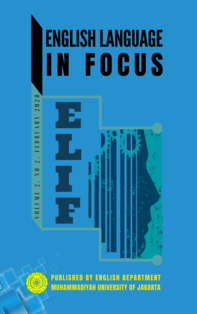Language Learning Strategies (LLS) Used by Malaysian, Pakistani, and Italian ESL Learners: Comparing to Indonesian EFL Learners
DOI:
https://doi.org/10.24853/elif.2.2.87-96Keywords:
English Language Learning, TEFL, and Language Learning Strategy.Abstract
This study deals with a review of the problematic approach in selecting Language Learning Strategies (LLS) due to the misleading the characteristics of English. Along with the purpose, this paper seeks to compare the differences between cultural and linguistic backgrounds of Indonesian EFL with Malaysian, Pakistani, and Italian ESL students’ Language Learning Strategy. In addition, this review also aims to know the Language Learning Strategy used by other ESL countries and to become the main purchase of this study to evaluate Indonesian’ Language Learning Strategy. In Indonesia, English becomes a foreign language where it is not an official language and has limited language input. Whereas, as we already know, English is a common subject learning for most people in Indonesia. This is due to the high interest and need for mastering English in various aspects. In learning English as a target language, people not only need to master their knowledge, but also the need for better and useful communicative competence in use. However, the need to come up with some appropriate teaching strategies becomes an important factor to achieve their goals.References
Alhaysony, M. (2012). Vocabulary Discovery Strategy Used by Saudi EFL Students in an Intensive English Language Learning Context. International Journal of Linguistics, 4(2), 518–535. Retrieved from http://dx.doi.org/10.5296/ijl.v4i2.1724
Aunurrahman, Kurniawati, T., & Ramadhiyanti, Y. (2013). Exploring Indonesian College Students Strategies in Learning English Language. Arab World English Journal (AWEJ), 4(3), 317–330. Retrieved from www.awej.org
Fleming, T., & Finnegan, F. (2010). Towards a critical theory of access and retention in Irish Higher Education - The National Forum Teaching and Learning Scholarship Database. In the 40th Annual SCUTREA Conference. University of Warwick, Coventry. Retrieved from http://eprints.maynoothuniversity.ie/2453/
Green, J. M., & Oxford, R. (1995). A Closer Look at Learning Strategies, L2 Proficiency, and Gender. TESOL Quarterly, 29(2), 297. https://doi.org/10.2307/3587625
Krashen, S. D. (1988). Second Language Acquisition and Second Language Learning. Prentice-Hall International.
Lou, Y. (2014). Study on Vocabulary Learning Strategies for Chinese English-Majors. In Proceedings of the 2014 International Conference on Management, Education and Social Science. Atlantis Press. Retrieved from https://doi.org/10.2991/icmess-14.2014.13
Norton, B. (2000). Identity and Language Learning. England: Pearson Education Limited.
O’Malley, J. M., & Chamot, A. U. (1990). Learning Strategies in Second Language Acquisition. Learning Strategies in Second Language Acquisition. Cambridge University Press. https://doi.org/10.1017/cbo9781139524490
Oxford, R., & Nyikos, M. (1989). Variables Affecting Choice of Language Learning Strategies by University Students. The Modern Language Journal, 73(3), 300. https://doi.org/10.2307/327003
Panggabean, H. (2015). Problematic Approach to English Learning and Teaching: A Case in Indonesia. English Language Teaching, 8(3), 35–45. https://doi.org/10.5539/elt.v8n3p35
Saputra, H. N., & Hadi, M. S. (2019). Teaching Vocabulary through Fly Swatter Game. English Language in Focus (ELIF), 2(1), 17–24. Retrieved from https://jurnal.umj.ac.id/index.php/ELIF/article/view/4829/3356
Stapa, S. H., & Majid, A. H. A. (2006). The Use of First Language in Limited English Proficiency Classes: Good, Bad Or Ugly? Jurnal E-Bangi, 1(1), 1–12. Retrieved from http://ejournal.ukm.my/ebangi/article/view/22069/6876
Zafar, S., & Meenakshi, K. (2012). Individual Learner Differences and Second Language Acquisition: A Review. Journal of Language Teaching and Research, 3(4), 639–646. https://doi.org/10.4304/jltr.3.4.639-646
Zare, P. (2012). Language Learning Strategies Among EFL/ESL Learners: A Review of Literature. International Journal of Humanities and Social Science, 2(5), 162–169. Retrieved from www.ijhssnet.com
Downloads
Published
Issue
Section
License
Authors who publish with this journal agree to the following terms:
- Authors retain copyright and grant the journal right of first publication with the work simultaneously licensed under a Creative Commons Attribution License that allows others to share the work with an acknowledgment of the work's authorship and initial publication in this journal.
- Authors can enter into separate, additional contractual arrangements for the non-exclusive distribution of the journal's published version of the work (e.g., post it to an institutional repository or publish it in a book), with an acknowledgment of its initial publication in this journal.
- Authors are permitted and encouraged to post their work online (e.g., in institutional repositories or on their website) before and during the submission process, as it can lead to productive exchanges, as well as earlier and greater citation of published work (See The Effect of Open Access).


